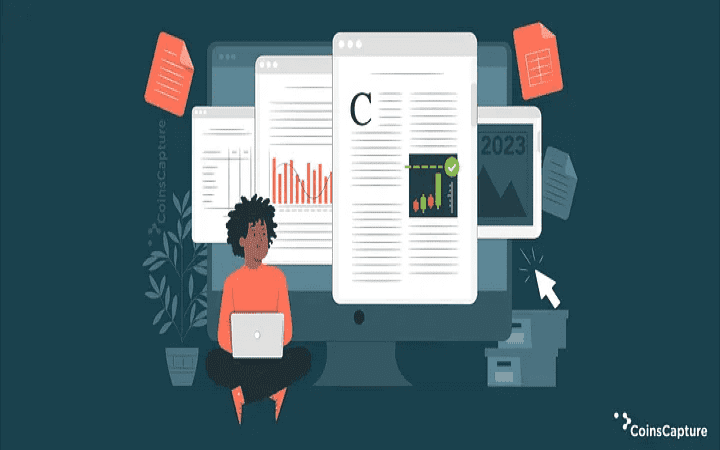BLOG


What You Should Read About Cryptocurrencies in 2023?
A growing number of people are getting into trading Cryptocurrencies as the market becomes increasingly common. If you are just like the rest of us, you probably have a lot of questions about Cryptocurrencies and the blockchain technology that underpins them. To that end, many authors have taken the time to explain the fundamentals of Cryptocurrencies and the blockchain, as well as related topics like algorithmic trading, Crypto wallets, NFTs, Crypto regulations, Crypto taxes, and the potential future of DeFi. Our recommendations for the greatest books on Cryptocurrencies contain something for everyone, whether you’re a voracious reader or just looking for a present for the holidays.
You should read these 6 Cryptocurrency books at least once in 2023:
1. The Basics of Bitcoins and Blockchains
The Cryptography book by Anthony Lewis is at the peak of the reading lists of both Rosencrance as well as Wallet. Lewis does a great job of introducing people to the world of Cryptocurrencies and explaining their worth. He also discusses the evolution of banking practices as well as the origins of currency. The Fundamentals of Bitcoin and Blockchain technologies provides a straightforward introduction to blockchain technology. The book explains what blockchain technology is, how it operates, and why it is useful. It covers the most popular blockchain systems, smart contracts, as well as things to think about before investing in Cryptocurrency. Cryptocurrency investment restrictions, Cryptocurrency exchanges, digital wallets, and spotting frauds are all discussed.
2. The Bitcoin Standard
In 2008, a pseudonymous programmer announced a new decentralized electronic payment system through a tiny internet mailing group; nevertheless, few individuals were aware of it. After 10 years, this newfangled autonomous decentralized software provides a worldwide, available actual currency option to contemporary central banks that seems irresistible. The Bitcoin Standard examines Bitcoin’s rapid ascent, the economic qualities which have contributed to that rise, and the Cryptocurrency’s potential economic, political, as well as societal repercussions. Whilst still Bitcoin was created in the internet era, the issue it seeks to address is the global movement of value, which is as ancient as human civilization itself. Beginning with the exchanging of limestones and seashells in prehistoric times, Ammous takes the reader on an interesting tour through the evolution of technology in fulfilling the duties of money, all the way up to and including metals, coins, the gold standard, as well as contemporary debt levels.
3. Mastering Bitcoin: Programming the Open Blockchain (2nd Edition)
The information in this specialized Crypto book is what you need to join the “internet of money,” as Rosencrance calls it. When it comes to Bitcoin as well as open blockchain technology, Andreas Antonopoulos is widely considered a world-leading authority. He is now on the advisory boards of a number of Bitcoin companies and has started three Bitcoin firms himself. This book, Mastering Bitcoin: Programming the Open Blockchain, explains Bitcoin for inexperienced users, high-level company leaders, and even speculators. For engineers, designers, network builders, and software architects, there is a section that explains how Bitcoin and Cryptocurrencies function. Bitcoin is a decentralized digital currency, and Antonopoulos explains its peer-to-peer design, transaction lifecycle, as well as privacy concepts. He uses human stories to illustrate fundamental technological principles like credentials, locations, as well as wallets.
4. Digital Gold
The revolutionary digital currency and financial technology known as bitcoin has given rise to a worldwide political group with idealistic aspirations. Despite being the punchline to many jokes, the concept of a new currency managed by the computers of users across the globe has grown into a technology worth billions of dollars, backed by the throngs of supporters who now consider what they consider to be the most significant new concept since the invention of the Internet. Everyone from Beijing to Buenos Aires are optimistic about the prospects of a decentralized monetary sector as well as a new digital global currency.
5. Blockchain Basics: A Non-Technical Introduction in 25 Steps
Skilled banker with years of experience Without relying on programming language, mathematical formulae, or other jargon, Daniel Drescher describes blockchain technology in a straightforward 25 stages. Drescher agrees with the significance of AI, big datasets, as well as robotic process automation in the trading of electronic securities. This Cryptocurrency book explores the implications of blockchain jargon on the economy. Understanding into the need of blockchain and the kind of issues it may address will be provided to the reader. Its power is in elucidating the technical features of blockchain and their use in business-related use cases.
6. The Internet of Money
The Internet of Money, unlike other publications, explores Bitcoin’s motivations rather than its mechanics. In his book Mastering Bitcoin, renowned information-security expert and author Andreas M. Antonopoulos analyzes and places bitcoin in perspective via a sequence of articles covering the exciting growth of this revolutionary technology. When Bitcoin was secretly presented to the globe in 2008, it revolutionized far beyond the financial sector. Bitcoin is shaking up traditional markets by giving people all around the globe more control over their own money. Andreas argues in this book that bitcoin is more than just a digital currency; it represents a financial and technical revolution.
